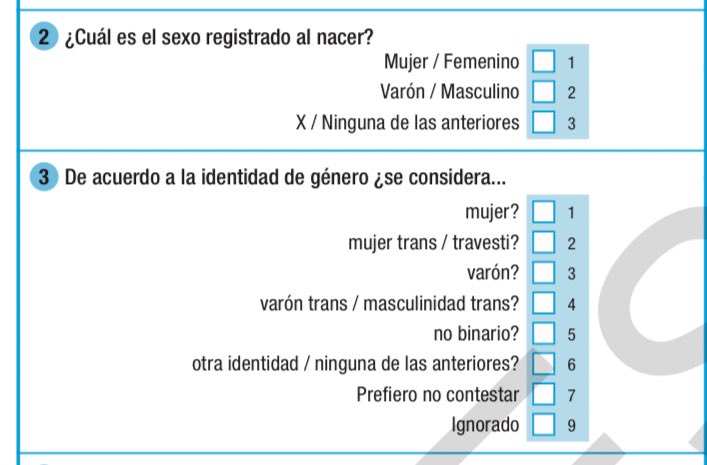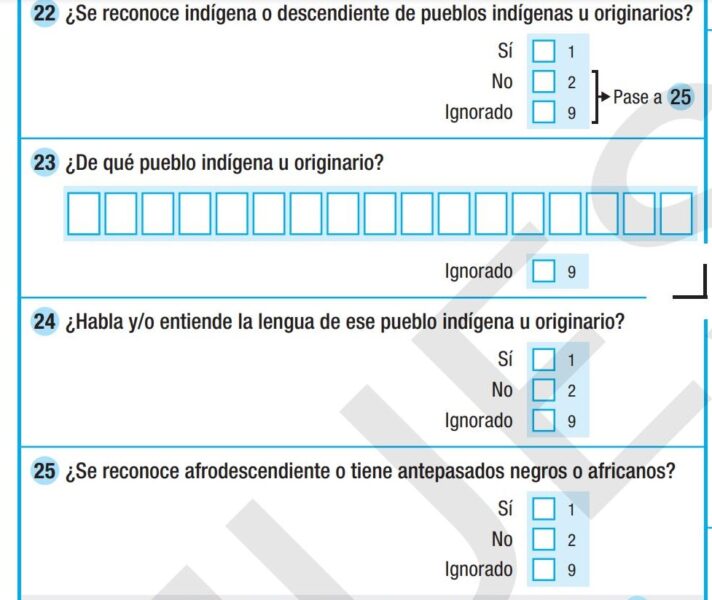
Image created by Global Voices with Canva.
For the first time, Argentina's upcoming census will ask questions on gender and ethnic identity. LGBTIQ+, Indigenous, and Afro-Argentine communities have celebrated the news as a landmark moment in terms of their recognition by the State and society.
Under the slogan #Reconocernos (“Acknowledging ourselves”), the National Population, Household, and Housing Census will take place in Argentina on May 18. It was originally scheduled for October 2020 but had to be postponed due to the COVID-19 pandemic.
Carried out by the National Statistics and Census Institute (INDEC [1]), the new census incorporates several new features [2]. Firstly, it is available in a digital [3] format, which has been live since March 16 and can be completed online on any device with an internet connection.
Secondly, the census will differentiate households from dwellings [4] for the first time (there is now the option of having more than one household within the same dwelling). This will better reflect the different real-life living situations of households across the country. It will also include questions on self-perceived gender [5] and ethnic identity, in particular those of African descent and Indigenous peoples.
As of April 14, around 4.2 million people [6] had already completed the online version of the census.
CENSO 2022 CON PERSPECTIVA DE GÉNERO Y ETNIA 📊 El #Censo [7] Nacional de Población, Hogares y Vivienda se realizará entre marzo y mayo del 2022. Por primera vez se incluirán preguntas sobre la autopercepción de la identidad de género y sobre el autorreconocimiento étnico. pic.twitter.com/rGSp3sahWr [8]
— Feminacida (@Feminacida) December 22, 2021 [9]
2022 CENSUS WITH GENDER AND ETHNICITY PERSPECTIVE. The #National Population, Household and Housing Census will take place between March and May 2022. It will include questions on gender and ethnic identity for the first time.
Gender diverse country
The inclusion of gender identity in the census will paint a picture of the demographic reality of a significant portion of the Argentine population. A national census not only collects data on the number of inhabitants of a country, but also on their socioeconomic, health, and cultural conditions. This makes it possible to create future public policies suited to the population's varying circumstances. Argentina is the first country in South America [10] to capture more information on gender identity.
In 2019, when the list of questions was made public, Marcela Tobaldi from the La Rosa Naranja Civil Association [11] and a member of the 100% Diversity and Rights National Network told Clarín newspaper [12]:
Tenemos el convencimiento de que terminar con la invisibilidad estadística del grupo travesti trans constituirá una bisagra en términos de políticas de población, lo que brindará el insumo necesario para el desarrollo de políticas públicas urgentes de reparación e inclusión.
We are convinced that ending the statistical invisibility of the trans community will lead to a change in population policies. This will provide the data necessary for the development of urgent public policies of reparation and inclusion.
The questionnaire first asks about the respondent's sex recorded at birth, which was assigned by their family. The options are male, female or none of the above. This provides a continuation of previous censuses. The next question asks about the respondent's gender identity and provides eight possible options.

Screenshot of the section of the census that asks about sex and self-perceived gender. Source: Website of Argentina's 2022 Census. [13]
There have been major advances in Argentina for the LGTBIQ+ community since the last census in 2010, including the Equal Marriage Act, the Gender Identity Act, and the Transgender Employment Quota Act. It was therefore important that the new census collected data in accordance with the realities already recognised in existing laws and in society itself.
Multi-ethnic Argentina
The census also expands on the subject of Indigenous peoples and now includes questions on the self-recognition of people as descendants of these groups and also on the use of their languages. Several Indigenous organisations coordinated the ‘Soy de raíces indígenas [14]‘ (I am of Indigenous descent) campaign, which encouraged the population to respond proudly to the questions about their roots.
Verónica Azpiroz Cleñan is a member of the Mapuche Indigenous people and is part of the Indigenous Professionals’ Network [15]. She spoke about the importance of this new question to Agencia Presentes [16]:
Lo más importante es que Argentina tiene que mirarse a sí misma y reconocer que su argentinidad está compuesta por un entrecruzamiento de Pueblos Originarios destinados a desaparecer en el diseño de país. Lo primero es bajar el nivel de racismo en la sociedad. Necesitamos que los datos muestren que lxs argentinxs no descendieron de los barcos. La ciudadanía argentina es pluriétnica.
It is important for Argentina to look at itself and recognise that its heritage is comprised of an intermingling of Indigenous Peoples who are destined to disappear within the make-up of the country. The first thing we need to do is to diminish the level of racism in society. We need the data to show that Argentines did not descend from the ships. The Argentine population is multi-ethnic.
The mention of ships alludes to a speech made by President Alberto Fernández at a press conference in which he said that “Argentines descended from ships.” This is in turn a reference to the European explorers who came and conquered the continent.
There was however a question in the 2010 census on Afro-descendant identity, but only as a sample on 10 percent of the forms. In the upcoming census, everyone will be asked: “Do you identify as Afro-descendant or do you have black or African ancestors?”
This is an important step forward for the Afro-Argentine organisations that have fought for decades against the systematic invisibility [17] and myth of a white and European Argentina [18], which now seems to be on its way out.

Screenshot of the section of the census that asks about Indigenous and African identity, and on the use of indigenous languages. Source: Website of Argentina's 2022 Census. [13]
Challenges, controversies, and injunctions
While these developments have been welcomed by the communities concerned and by the majority of the population, there has also been criticism voiced from some quarters. For example, one of the first complaints arose from doubts about data protection [19] and the lack of anonymity of the digital census.
In February, the Indigenous Professionals’ Network [20] filed an injunction [21] to prevent the census forms from being printed. They complained that the question concerning ethnic identity did not include a list of Indigenous peoples (it is instead an open question and asks the respondent to name which Indigenous group they belong to), which they believed would result in statistical invisibility [22].
Adriana Gerez. Pueblo Diaguita. Algunas de sus frases: Desde el tejido de profesionales indígenas exigimos que en el Censo 2022 se formulen las preguntas de modo tal que los pueblos originarios seamos vistos con mayor nitidez. (hilo) pic.twitter.com/vUrGm3cZcq [23]
— Caminos Ancestrales (@CaminosAncestr3) March 28, 2022 [24]
Adriana Gerez. Diaguita people (a group of Indigenous people native to Chile and Argentina). We, the network of Indigenous professionals, demand that in the 2022 Census the questions be formulated in such a way that more attention is given to native peoples. (thread)
With regards to the question on gender identity, researcher and activist Marce Joan Butiérrez wrote an article [25] for LATFEM in which she analysed the various challenges of recognising the trans population in national statistics:
La pregunta sobre sexo pone al encuestadx en una situación de “confesión” de una información sensible y personal; y las opciones brindadas en la respuesta a la pregunta sobre identidad de género son poco precisas y exhaustivas, lo que se prestaría a confusiones y fallos en la medición.
The question on sex forces the respondent to reveal sensitive and personal information; and the options given in the answer to the question on gender identity are inaccurate and exhaustive, which would lead to confusion and incorrect records.
Furthermore, a group of women filed a controversial injunction [26] against the 2022 Census, claiming that the question on “sex assigned at birth” should only say “sex,” and that “female” and “male” should not be considered as identities.
Despite the criticism, most organisations and communities agree that this census is a huge step forward. It could be considered to be a transitional census between the past and the future, given that there are still many challenges to overcome in order for it to become an adequate tool for surveying the population in all its diversity.